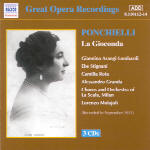This bizarrely plotted potboiler almost never fails if the singing has enough thrills, and this set, the first Gioconda ever recorded, is certainly thrilling. The 1931 sound has been nicely cleaned up and almost never distorts; Naxos’ transfers have left in the highs even where there’s a bit of danger of overload, and you won’t mind. The La Scala forces and Lorenzo Molajoli’s leadership are typically rough and ready for the period, and the action keeps moving.
Alessandro Granda’s Enzo has plenty of Italianate bite, and what he lacks in finesse or easy high notes he makes up for in sheer animal magnetism; Gaeanto Viviani’s Barnaba is only a step or two below that level and he makes a good snarling villain. Corrado Zambelli’s Alvise is properly vengeful, the young Ebe Stignani’s Laura is well sung if mature-sounding (did this singer ever sound young?), and Camilla Rota’s La Cieca is sensitively done. Which leaves us with the set’s real strong point: The Gioconda of Giannina Arangi-Lombardi. Starting life as a mezzo, Arangi-Lombardi’s voice was big and rich; the top notes gleam and she has no fear of chest register, even if it does seem disconnected from the rest of the voice. She may not be the deepest-thinking Gioconda on disc, but she’s wonderful and her performance should be heard.
The last (almost) 50 minutes of CD 3 is devoted to Arangi-Lombardi singing arias and duets: the Lombardi arias are fine, “Casta Diva” has some interesting flat singing, a duet from Ernani is filled with passion, and two Forza excerpts are lovely, important interpretations. This is a fine curiosity, and fans of Arangi-Lombardi will need it, especially at its bargain price.
































